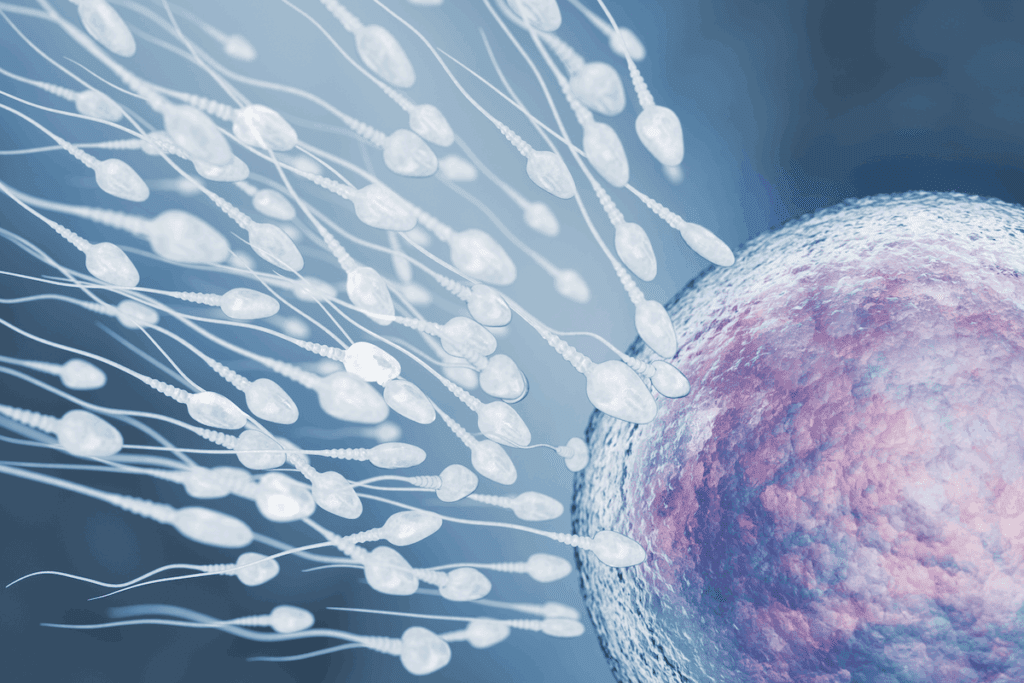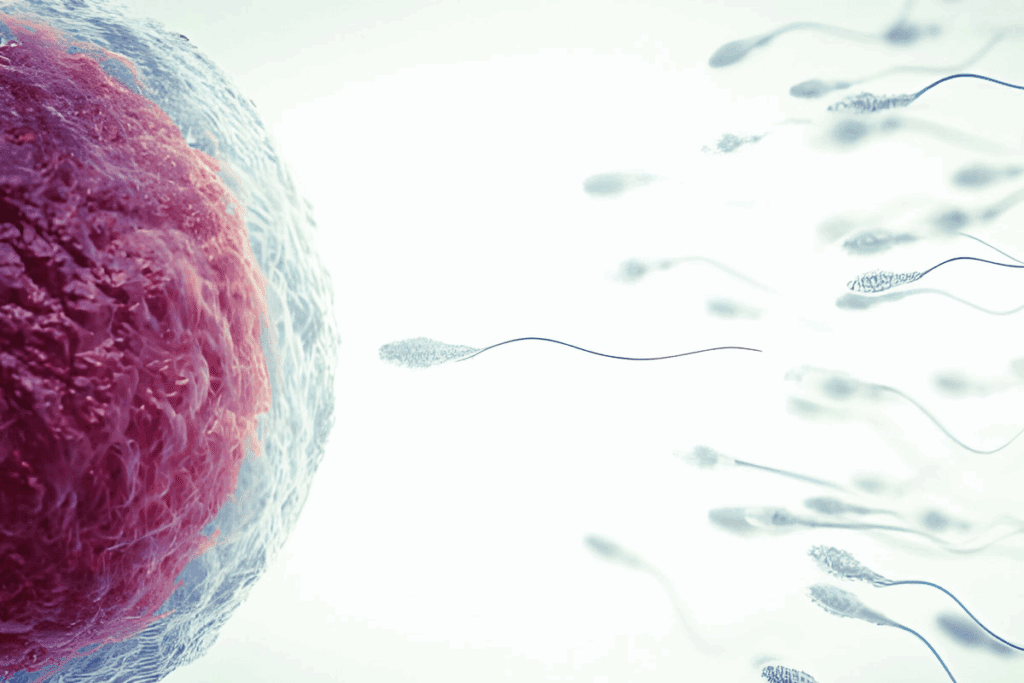Last Updated on November 25, 2025 by Ugurkan Demir

Men start producing sperm at puberty and keep doing so for most of their lives. But, the quality and amount of sperm go down as they get older. At Liv Hospital, we have advanced ways to help men with their reproductive health when do guys stop producing sperm.
Male fertility starts to drop around age 35 and gets worse after 40. It’s important for men thinking about having kids later in life to know about male fertility. We look into how sperm production changes as men age.

To understand male fertility, we need to look at its biological basics. The male reproductive system is made up of organs and hormones. These work together to make sperm.
The male reproductive system includes the testes, epididymis, vas deferens, seminal vesicles, prostate gland, and urethra. The testes make sperm through a process called spermatogenesis.
Hormones are key in controlling sperm production. Testosterone, made by the testes, is vital for making sperm. The hypothalamus and pituitary gland also help by releasing hormones that boost testosterone.
Spermatogenesis takes about 64 to 74 days to finish. During this time, immature cells in the testes grow into mature sperm. Millions of sperm are made every day, showing how amazing the male reproductive system is.
| Component | Function |
| Testes | Produce sperm and testosterone |
| Epididymis | Stores and matures sperm |
| Seminal Vesicles | Produce seminal fluid |
| Prostate Gland | Produces additional seminal fluid |
Knowing how male fertility works is important. It helps us understand how sperm production is controlled and how it changes over time.

As boys enter puberty, their bodies start making sperm. This is a big step towards becoming fertile. Puberty happens between ages 11 and 14, bringing big changes in the body and hormones.
At puberty, the hypothalamus starts making GnRH. This hormone tells the pituitary gland to release LH and FSH. These hormones get the testes to start making sperm.
Spermatogenesis is how immature cells turn into mature sperm. It happens in the seminiferous tubules of the testes. This is key for male fertility.
Male fertility grows from puberty and keeps getting better with age. Even as men get older, they usually stay fertile.
| Age Range | Developmental Milestone |
| 11-14 years | Onset of puberty and start of spermatogenesis |
| 12-15 years | First appearance of sperm in semen |
| 14+ years | Continued development and maturation of sperm production |
Knowing these milestones helps us understand male fertility’s journey. We’ll look at how sperm production changes as men age.
The journey of sperm development, known as spermatogenesis, is a highly orchestrated process. It involves multiple stages and is key for male fertility.
Understanding spermatogenesis is complex. “Spermatogenesis is a remarkable example of the human body’s ability to produce millions of sperm daily,” say fertility experts.
Spermatogenesis takes about 64 to 74 days. During this time, immature cells in the testes change into mature sperm cells. This process includes several stages like proliferation, meiosis, and maturation.
The development of sperm starts at puberty and goes on throughout a man’s life. But, factors like age, lifestyle, and health can affect sperm quality and quantity.
The testes produce millions of sperm every day during spermatogenesis. This high rate is needed to ensure healthy sperm for fertilization.
Research shows a healthy adult male can make up to 1,500 sperm per second. This means millions of sperm are produced daily. This shows how efficient the male reproductive system is.
Exploring spermatogenesis shows how important daily sperm production is for male fertility. Factors that affect spermatogenesis can greatly impact reproductive health.
Men don’t have a specific age when they stop making sperm. But, their ability to make sperm does change as they get older. This is important to know about men’s reproductive health.
Many think men either keep making sperm forever or stop suddenly at a certain age. The truth is more complex. Men don’t stop making sperm like women do with eggs. But, the quality and amount of sperm do get worse with age.
Studies show that men’s fertility starts to go down in their late 30s to early 40s. But, how fast it goes down can vary a lot. Things like lifestyle, health, and environmental factors can affect how fast it happens.
Looking at how men and women age differently is interesting. Women are born with a set number of eggs that run out by menopause, usually around 50. Men, on the other hand, keep making sperm their whole lives, but the quality and amount get worse over time.
This big difference is important for planning families. Women have a clear time to have kids, but men’s fertility stays good for longer. But, getting older can mean more risks of genetic problems and health issues for their kids.
It’s key for couples planning to have kids or for men thinking about being dads later in life to understand these differences. Even though men don’t “run out” of sperm, the chances of having healthy kids get lower with age.
By understanding how male fertility changes over time, we can handle the challenges and chances in reproductive health better.
As men get older, changes in sperm production become more important. These changes affect how many sperm are made and their health. The way sperm is produced changes a lot with age.
Studies show that men produce fewer sperm as they age. The amount and count of sperm go down, mainly after 40 to 50. This is due to hormone changes and the aging of the testes.
The total sperm count can drop by up to 30% between 40 and 50. This drop can make it harder for couples to have a baby.
| Age Group | Average Sperm Count (million/ml) | Total Sperm Volume (ml) |
| 20-30 | 60-80 | 2.5-3.5 |
| 40-50 | 40-60 | 2.0-3.0 |
| 60+ | 20-40 | 1.5-2.5 |
Not only does the number of sperm decrease with age, but their quality does too. Older men’s sperm often has DNA fragmentation. This can lower fertility and increase the risk of genetic problems in children.
Having children later in life can pose risks. These risks include miscarriage, chromosomal issues, and genetic disorders.
Men planning to have children later should talk to doctors. They can learn about their fertility and any risks related to older fatherhood.
As men reach middle age, they go through many changes that affect their ability to have children. This time, from the 40s to 50s, brings big changes in hormones, how the testicles work, and the chance of genetic problems.
Testosterone, key for making sperm, starts to drop as men get older. This drop can make sperm quality and amount change. Hormonal shifts also play a big role in how well a man can reproduce.
Other hormones, like inhibin B, which helps control FSH, can also change. High FSH levels mean the testicles are not working as well. These changes make it harder for men to have kids during this time.
The testicles are key for making sperm and testosterone. As men get older, testicular function can get worse. This affects sperm quality and hormone balance. Older men might have sperm that moves less and has more DNA damage.
| Age Group | Sperm Motility (%) | DNA Fragmentation (%) |
| 20-30 | 60-80 | <15 |
| 40-50 | 40-60 | 15-25 |
| >50 | <40 | >25 |
Getting older means a higher chance of genetic mutations in sperm. This is because DNA errors build up over time. Older men are more likely to have kids with genetic problems, like achondroplasia and autism.
It’s important for men thinking about having kids later to talk to a doctor. They can discuss fertility and any risks of having children at an older age.
Men face many factors that can change their sperm production. Knowing these factors is key to keeping reproductive health good.
What you do every day affects your sperm health. Diet, exercise, and stress levels are big factors. Eating right and staying active can boost sperm quality. But too much sitting and stress can harm it.
Studies show that a healthy weight, regular exercise, and not drinking too much alcohol help sperm health. But smoking and drugs can hurt it.
Some health issues can really affect sperm production. Varicocele, infections, and hormonal imbalances are examples. Varicocele, for instance, can lower sperm quality and amount.
Infections like epididymitis and orchitis can harm the tissues that make sperm. Also, not having enough testosterone can mess up how sperm are made.
| Medical Condition | Impact on Sperm Production |
| Varicocele | Reduced sperm quality and quantity |
| Infections (e.g., epididymitis, orchitis) | Damage to sperm-producing tissues |
| Hormonal Imbalances (e.g., low testosterone) | Disrupted spermatogenesis |
Some things in the environment and at work can also affect sperm. Pesticides, heavy metals, and radiation are harmful. People working with these can be at risk.
For example, being around pesticides for a long time can lower sperm count and how well they move. Heavy metals like lead and mercury can also damage sperm DNA.
By knowing these factors and taking steps to reduce their impact, men can protect their reproductive health. This helps keep sperm production at its best throughout their lives.
More men are thinking about becoming fathers later in life, in their 40s, 50s, and beyond. Men’s fertility does decrease with age, but not as quickly as women’s. We’ll look at what affects a man’s ability to have children at an older age.
Natural conception rates do drop with age, but men’s decline is slower than women’s. Research shows men over 40 can father children, though chances are lower. The success rates of natural conception depend on several factors, like the age of both partners and their health.
It’s key for couples to grasp these facts when planning a family.
Older men face higher genetic risks. As men age, their sperm quality can worsen, leading to genetic mutations. Risks include:
Many famous people have become fathers later in life, showing it’s possible to have a healthy child at an older age. Examples include:
These cases show that, despite challenges, it’s achievable.
In summary, while there are challenges, many men can become fathers later in life. Knowing the factors involved helps prospective parents make better choices.
Keeping fertility high as men age needs healthy habits and sometimes medical help. As men get older, their ability to have children may drop. But, there are ways to keep their reproductive health strong.
Changing your lifestyle can greatly improve sperm health. Keeping a healthy weight, exercising often, and eating well with lots of antioxidants can boost sperm quality. Also, cutting down on stress with meditation or yoga is good.
Avoiding too much heat, like from hot tubs or saunas, is key. High temperatures can harm sperm production. Drinking less alcohol and quitting smoking are also important, as they can hurt fertility.
For men thinking about having kids later, there are medical ways to keep fertility alive. Sperm freezing, or cryopreservation, is an option for delaying fatherhood. It stores sperm samples at very cold temperatures for later use.
Other medical steps might treat issues like hormonal problems or infections that could affect fertility. Talking to a healthcare provider or fertility specialist can help men understand their choices and make smart decisions.
Regular health checks are key for keeping fertility. Annual check-ups can spot problems early, so they can be fixed quickly. These might include tests for hormone levels, sperm analysis, and overall health checks.
By being proactive about health, men can keep their fertility strong as they age. It’s also important to talk about family health history and any worries with a doctor.
| Lifestyle Change | Impact on Sperm Health |
| Maintaining a healthy weight | Improves sperm quality and count |
| Regular exercise | Enhances overall reproductive health |
| Balanced diet rich in antioxidants | Protects sperm from oxidative stress |
| Reducing stress | Can improve sperm production and quality |
Understanding male fertility is key for men thinking about having kids. We’ve looked into the complex process of sperm making, from puberty to the factors that affect it as men age.
The journey to male fertility is shaped by many things, like age, lifestyle, and health issues. As men get older, their ability to make sperm changes. At Liv Hospital, we focus on helping men keep their reproductive health in top shape.
Men can take steps to keep their reproductive health strong. By knowing how sperm is made and what affects it, men can make better choices. We urge men to look after their fertility and get help when they need it. This way, they can make smart decisions about their reproductive health.
Men don’t stop making sperm completely. But, the amount and quality go down as they get older. This usually happens around the 40-50 year mark.
Men don’t stop making sperm completely. But, the amount they produce goes down a lot as they age. This often starts after 40-50 years.
Men’s fertility goes down with age. But, they can stay fertile well into their 50s and even older. The quality and amount of sperm just get worse.
No, men don’t stop making sperm completely. But, the rate and quality of sperm-making go down as they get older.
There’s no exact age when men stop making sperm. But, the amount they produce goes down a lot around 40-50 years old.
Yes, men can make sperm their whole lives. But, the quality and amount of sperm go down as they age.
Sperm production doesn’t stop completely in males. But, it goes down with age, usually after 40-50 years.
Men can make sperm their whole lives. But, the quality and amount of sperm go down as they get older.
Men’s sperm quality starts to go down around 40-50 years old.
Men can make sperm their whole lives. But, the quality and amount of sperm go down as they age.
Many things can affect sperm production in men. This includes lifestyle choices, medical conditions, and environmental exposures. These factors can change throughout a man’s life.
National Center for Biotechnology Information. (2025). When Do Men Stop Producing Sperm Age Fertility. Retrieved from https://pmc.ncbi.nlm.nih.gov/articles/PMC3253726/
Subscribe to our e-newsletter to stay informed about the latest innovations in the world of health and exclusive offers!